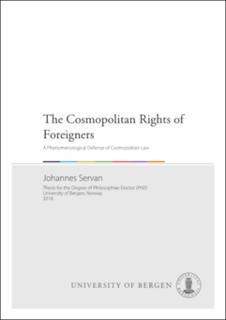| dc.description.abstract | This thesis argues that states have cosmopolitan obligations of a moral-legal character. These obligations are articulated as “cosmopolitan law”, which is a Kantian term referring to the morallegal norms that regulate the relation between states and foreigners. The main example of cosmopolitan law today is found in the right to asylum. In the first part, I argue that the globalized circumstances actualize the need for an extension of this law and therefore I consider some of the main contributors to the extension of cosmopolitan law, namely Immanuel Kant, Hannah Arendt and Seyla Benhabib. I also situate this Kantian account in the immigration debate and conclude that I prefer Benhabib’s position compared to other positions in the current discussion. In the second part, I take some distance from Benhabib’s reading of Arendt and seek to explore an alternative reading informed by a Husserlian phenomenological perspective. I tend to agree with a more radical reading of Arendt, which seeks to balance the institutionalist and performative aspects of her thinking. My reading is grounded in a systematic conceptual analysis of Arendt’s more theoretical perspectives that are found in The Human Condition, in central chapters of The Origins, and in some of her essays. My main point is to show how central the significance of the co-presence of others is to her thinking. Through a phenomenological reading, the richest experiential mode of this co-presence – as “fully human” – is taken to be the basic experience that motivates Arendt’s typology of modes of activities and her normative ranking of principles of action. Further, informed by Alfred Schutz’s conceptual framework of social relations, I discuss in more detail what this experience of the “fully human” could entail. I argue that this mode of experience has normative implications both on the face-to-face level of interaction, and on the level of indirect interaction among strangers. The main implication of this reading is that Arendt’s contribution should not be understood – as Benhabib seems to suggest – only as an extension of the content of cosmopolitan law within the Kantian framework. Decisively, Arendt’s thinking should be considered as a reconceptualization of the guiding principles of political thought and a new concept of human dignity. I argue that this reconceptualization allows for an extension of cosmopolitan law more adequately adapted to the circumstances of our times than the Kantian framework. | en_US |
